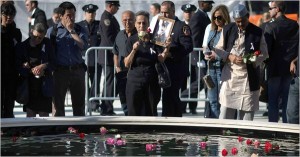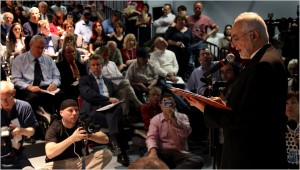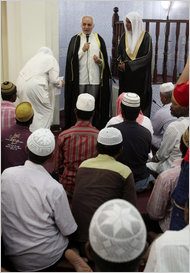9/11 Memoirs
 The ninth anniversary of Sept. 11 passed in New York this weekend with a focus on the two fracases of the day: the “Ground Zero mosque” and the would-be Koran burners and their emulators.
The ninth anniversary of Sept. 11 passed in New York this weekend with a focus on the two fracases of the day: the “Ground Zero mosque” and the would-be Koran burners and their emulators.
For the decade between the fall of the Berlin Wall and the fall of the Twin Towers, many Americans turned away from the rest of the world, a regretful sort of superpower powernap. Talking about Sept. 11 is shorthand for talking about how America should exercise its power in the wider world, how to measure blowback, how to balance soft and hard power, how to curb extremism at its roots while also pruning its branches.
Anne and Manny Fernandez wrote a piece yesterday that catalogues what 9/11 looks like today, rather than trying in overwrought prose to figure out what it means. They focus on “an unmistakable sense that a once-unifying day was now replete with division” – although one could argue that from the first decisions that followed the Sept. 11 attacks American political life grew more divided than ever.
In a similar vein, I reviewed Scott Malcomson’s memoir in the Times’ Sunday Book Review section. Reading his recollection of 9/11 and the years that followed forced me for the first time in ages to recall their intensity and the sense of a bottom falling out.
The morning of Sept. 11, 2001, found me on my stoop in Boston’s South End, waiting for a ride to work. One minute I was enjoying the sunshine, worrying about the logistics of moving house. Then the first plane struck the north tower of the World Trade Center and my entire frame of reference lurched. What I don’t quite remember is how that painful, personal moment connected to America’s national experience in the aftermath of the attacks — and to what many saw as the erosion of civil liberties, unnecessary wars and the willingness to scorn allies and international institutions.
It is this link that concerns Scott L. Malcomson in “Generation’s End: A Personal Memoir of American Power After 9/11.” How, Malcomson inquires, did the world’s sole superpower surrender its better judgment and squander so much good will? Read the rest.
Normalcy, perhaps, is a feeling that only prevails in historical retrospect.
New York, Viewed from the Rest of the World
 I’ve spent much of the last week covering the Park51 story from the Arab world. The entire affair has attracted far less attention in the Islamic world than one might expect. We put together a story that canvassed global reaction in today’s Times.
I’ve spent much of the last week covering the Park51 story from the Arab world. The entire affair has attracted far less attention in the Islamic world than one might expect. We put together a story that canvassed global reaction in today’s Times.
If the project’s organizers move the site, or cancel it altogether, I’d expect stronger opinions than we’ve seen so far. Same if there’s a major shift in public opinion, or a spate of violent attacks, or nastier rhetoric than we’ve seen so far.
For more than two decades, Abdelhamid Shaari has been lobbying a succession of governments in Milan for permission to build a mosque for his congregants — any mosque at all, in any location.
For now, he leads Friday Prayer in a stadium normally used for rock concerts. When sites were proposed for mosques in Padua and Bologna, Italy, a few years ago, opponents from the anti-immigrant Northern League paraded pigs around them. The projects were canceled.
In that light, the furor over the precise location of Park51, the proposed Islamic community center in Lower Manhattan, looks to Mr. Shaari like something to aspire to. “At least in America,” Mr. Shaari said, “there’s a debate.”
Across the world, the bruising struggle over an Islamic center near ground zero has elicited some unexpected reactions.
For many in Europe, where much more bitter struggles have taken place over bans on facial veils in France and minarets in Switzerland, America’s fight over Park51 seems small fry, essentially a zoning spat in a culture war.
But others, especially in countries with nothing similar to the constitutional separation of church and state, find it puzzling that there is any controversy at all. In most Muslim nations, the state not only determines where mosques are built, but what the clerics inside can say.
The one constant expressed, regardless of geography, is that even though many in the United States have framed the future of the community center as a pivotal referendum on the core issues of religion, tolerance and free speech, those outside its borders see the debate as a confirmation of their pre-existing feelings about the country, whether good or bad.
The “Ground Zero” Imam
 Imam Feisal Abdul Rauf, leader of the Park51 project (you know, the Islamic community center in Lower Manhattan), kept quiet about the controversy back home during his visit to Bahrain this week. He was on a US State Department trip promoting interfaith dialogue, tolerance, and his long-running project to inject his philosophy of adaptable American Islam into the worldwide Islamic debate. Initially, the State Department tried to shield the imam from publicity, but eventually relented – slightly – by making public one event in each of the three countries Imam Feisal is visiting.
Imam Feisal Abdul Rauf, leader of the Park51 project (you know, the Islamic community center in Lower Manhattan), kept quiet about the controversy back home during his visit to Bahrain this week. He was on a US State Department trip promoting interfaith dialogue, tolerance, and his long-running project to inject his philosophy of adaptable American Islam into the worldwide Islamic debate. Initially, the State Department tried to shield the imam from publicity, but eventually relented – slightly – by making public one event in each of the three countries Imam Feisal is visiting.
In Bahrain, I managed to secure my own invite to the majlis of Sheikh Salah al-Jowder. He’s an oddity, a moderate salafist who sits on an interfaith dialogue committee in Manama (it’s interesting that such a thing even exists). There, Imam Feisal talked a bit about the center, because his hosts had a lot of questions.
The latecomers to Sheik Salah al-Jowder’s majlis, or weekly assembly, wished peace upon their cousins and shook all the men’s hands before sitting down on the deep striped sofas that lined the oblong reception hall.
Imam Feisal Abdul Rauf, leader of the planned Park51 Islamic community center in Lower Manhattan, was sipping Arabic coffee about an hour before midnight Sunday in Muharraq, a crowded neighborhood near the international airport.
On the first stop of his good-will tour, sponsored by the State Department, Mr. Abdul Rauf talked expansively about religious law, the lessons of Islamic history and his mission to build bridges between the West and the Islamic world — any topic, it seemed, but the controversy that lately has made him famous.
About 20 Bahraini men, in flowing white robes and headdresses held in place with braided leather bands, fiddled with their BlackBerrys, drank coffee and fingered beads.
After Mr. Abdul Rauf had spoken, and exchanged pleasantries with his hosts, one of the Jowder cousins raised his voice.
“I know you have the support of President Obama,” he said, almost shouting to be heard over the air-conditioners. “But why don’t we just change the place, to show that Islam is not there to threaten everybody, that Islam is a religion of peace?”
Imam Feisal is in Qatar now, and will visit the United Arab Emirates before returning to the U.S. in early September. He said he will talk to the American media then. For now, he insists, he wants to focus on the Cordoba Initiative’s outreach project.
A lot of his most controversial ideas – at least in the Islamic world – have to do with his belief that Islam takes a different shape in every host culture. American Islam, Imam Feisal argues to his audiences in the Islamic world, has just as much religious legitimacy as Egyptian Islam, or Persian Gulf Islam, or Malaysian Islam, and so on. He makes his argument quietly, but it’s a position that runs squarely counter to the trends in the Arab world toward a more orthodox view of Islam. Imam Feisal believes that Muslims in Egypt can learn from the way American Muslims interpret their faith, and not just vice versa.
For a sense of those ideas and their origin, you can read Anne Barnard’s fabulous profile of Imam Feisal (on which I collaborated from Cairo). She also parses some of the claims about him circulating in the blogosphere.

